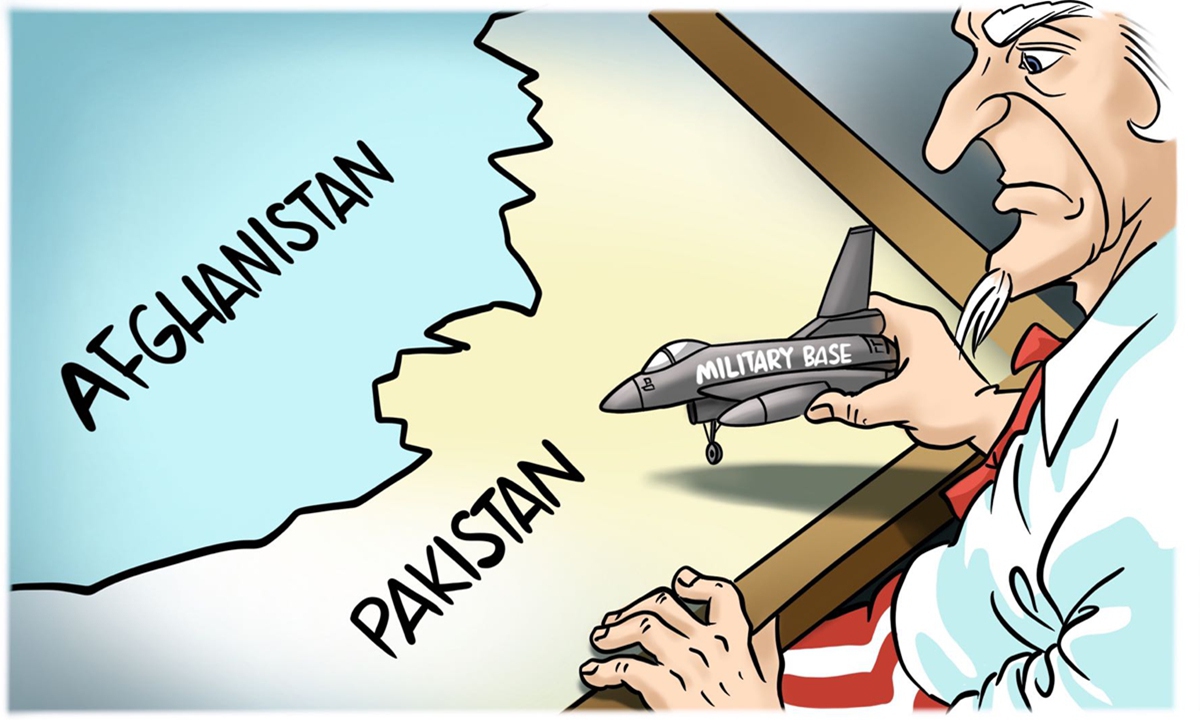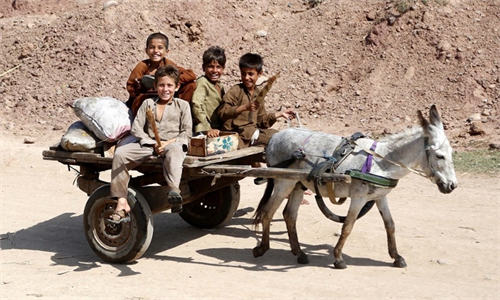
Illustration: Liu Rui/GT
Pakistan will "absolutely not" allow the CIA to use bases in the country to conduct cross-border counterterrorism missions against Taliban after US troops withdraw from Afghanistan, said Pakistani Prime Minister Imran Khan to "Axios on HBO" in an interview aired on Sunday.
"There is no way we are going to allow any bases, any sort of action from Pakistani territory into Afghanistan. Absolutely not," said Khan without hesitation, reflecting Islamabad's distrust of Washington.
This sentiment stretches back to 2004 when Washington designated Pakistan as one of its major non-NATO allies. In fact, Islamabad hasn't been fairly treated with enough respect by Washington in recent years.
In January 2021, a Republican Congressman introduced a bill to terminate Pakistan's designation as a major non-NATO ally of the US. Later in March, Khan wasn't on the initial list of 40 world leaders invited by the Biden administration to the Leaders Summit on Climate held in late April - even the prime minister of Bhutan, a small Asian country, was on that list.
For a long time, Pakistan has tried to improve ties with the US, but failed to get ideal results. So it is not surprising to see Islamabad resolutely rebuke Washington's request to have CIA sites on Pakistani soil, said Zhou Rong, a senior researcher at the Chongyang Institute for Financial Studies at Renmin University of China.
Besides, Pakistan is clearly aware that having the CIA on its soil will seriously anger the Taliban, which has warned neighboring countries not to allow the US army to use their military bases and airspace against Afghanistan. Islamabad doesn't want to put its people under risk.
Moreover, Zhou said that having the CIA on its soil will probably destabilize Pakistan. "In addition to counterterrorism operations as the CIA claims, they may also engage in penetration into Pakistan, posing threats to the projects under the framework of China-Pakistan Economic Corridor, and then jeopardize Pakistan's cooperation with China," noted Zhou. He added that Islamabad will be reluctant to see such a scenario become real.
Some observers say the northern part of India is also close to Afghanistan, which meets the needs of the CIA to monitor Taliban. But because of Washington's plans in Central and Southern Asia, the US has been underlining the importance of military bases in Pakistan. Washington has always wanted to enlarge its sphere of influence in the region from Kazakhstan to Myanmar. Yet because of Islamabad's good ties with Beijing, it has been hard for Washington to realize this strategy.
Thus, Pakistan has become a vital point in the US blueprint in this regard, especially as the US faces difficulty borrowing military bases in Afghanistan's neighboring countries, Zhou said. Central Asian countries won't simply let US troops in without communicating with China and Russia in advance.
Washington believes that Islamabad can be manipulated by offering some benefits, such as refraining from naming Pakistan on the list of States Sponsor of Terrorism. Meanwhile, Pakistan also needs loans at preferential interest rates from the IMF, which is controlled by the US. Therefore, the US thinks Pakistan will heed whatever it says; until they got a surprise from Islamabad that told them firmly, "No."
Khan said, "We cannot afford anymore military actions from our territory." Still, Washington only wants to make full use of this Asian county.
The US has fought the war on terror in Afghanistan for 20 years, spending nearly $2 trillion. Yet all it left in the country is a mess. For these, the US won't shoulder its own responsibility at all. It will only calculate over how to protect its own interests. In a most reckless way, Washington is disregarding the entire region. This is another contour of the ugly "America First" policy. If Washington expects to use Pakistan's bases, then it is clearly revealing its selfish purposes.
The author is a reporter with the Global Times. opinion@globaltimes.com.cn

